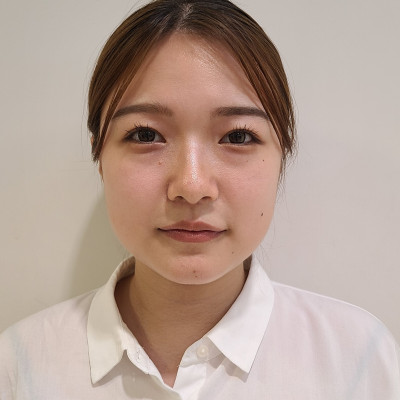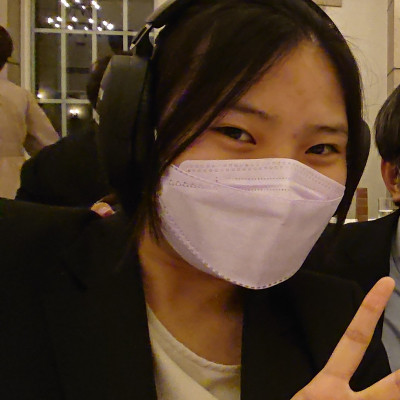Sessions / Students: Poster Session ポスターセッション 55 minutes / 55 分
Food Supply and Food Waste #3941
I am now a freshman in college, and in my English class I researched global issues. I focused my research on "Food Supply and Food Waste ." This is because I felt that food supply and food waste are not only problems around the world, but also familiar to us. I had done a little research on this subject when I was in high school, and wanted to explore a topic more familiar and local to us. And I first researched "What is food loss?" Next, I interviewed family and friends close to me to find out if there are any efforts to reduce food loss in the community and what companies are doing so. For example, my mother told me about a food loss reduction project being carried out in her hometown of Niigata. I didn't know this kind of activity was going on locally, so I wanted more people to know about it. At the conference, what can we as individuals do to reduce food waste? I would like to talk about it.
Reducing Food Loss and Waste in Japan: An Environmentally Friendly Approach #3944
In this poster presentation, I will propose one idea on how to reduce food loss and waste in Japan. To guide my thinking, I set two research questions; what is the situation of food loss and waste in Japan in comparison to the rest of the world? and what can be done to reduce Japan's food loss and waste. First, I will provide the background of food loss and waste by referring to environmental damages and the north-south divide including the differences between food loss and waste. Second, I will answer my first question looking into the current situation of food loss and waste in Japan in my readings of the literature. In addition, I will compare the actions which have been taken for food loss and waste in Japan and Europe. Finally, I will offer and discuss my idea to deal with food loss and waste in Japan to answer the second research question. I will conclude my session by summarizing the main points and would like to talk to the participants about the issue and actions we can take to reduce food loss and waste.
Gender discrimination against young people in Japan #3945
I am a second-year university student who got interested in gender discrimination in Japan because I found this issue related to me when thinking about job-hunting, which I am going to start next year. I researched the issue of gender discrimination in a project and then in a seminar at university, and I plan to do more research ahead of the LD30 conference. My poster highlights how young people in Japan face discrimination based on gender, mainly discrimination against women and gender minorities through bullying at school and in workplaces. I tried to think of this issue at both macro and micro levels, so I did research and talked with people close to me. I also met people who are related to the activities of gender minorities. My poster includes the results of these conversations with others about their personal experiences and perspectives, as well as concepts I got through these interactions. In this presentation I also propose ways to take action against gender discrimination. These actions include not only solutions that companies and schools can take, but also what I can do for this issue as a young woman.
University students as stakeholders for the SDGs: Introducing KUIS DGtaLink #3948
KUIS DGtaLink is the one of the school community in KUIS. The word of “DGtaLink” is a coined word, it is “SDGs”, “Digital” and “Link”. This community was named with the hope that we want to connect and link KUIS students, teachers and managers by SDGs with digital platforms. Achieving the SDGs will require collective action from multiple stakeholders, including university students. This presentation provides an overview of the development of a student community focused on the SDGs at a private university in Japan. In particular, it will explain the background to the community, the purpose and aims, as well as our vision to take the community forward. In addition, the presentation will highlight some of the challenges we faced when developing the group. For example, seeking members to join the group or to manage digital platform.
Create Planet Culture ~The insatiable challenge to unite the world~ #4000
I am a second-year university student. My interest in cultural exchange was sparked by meeting a girl who had immigrated from Sudan to Japan. It made me realize that there are various cultures in this world, each existing in different countries and regions. However, I wonder if there is truly a global connection through these cultural exchanges. My poster focuses on the idea of cultural exchange that embraces differences in language, race, and geographical locations, encompassing the world. Even if we can't communicate through words or come from different places, we can understand each other and create something together. To convey this message to the world and expand the circle of cultural exchange on a global scale, I took the first step towards an "insatiable challenge," which I will present in this time. I would like to discuss with all of you the importance of intercultural understanding and co-creation, cherishing cultures from around the world, and how we can collectively build a culture as one planet, Earth.
How do PR methods and marketing strategies for fair trade products affect consumers' willingness to purchase them? (Comparison between Japan and the UK.) #4001
I am a fourth-year university student who became interested in marketing strategies for fair trade after participating in an online internship with an ethical clothing company in Cambodia when I was in second grade. One of my tasks was to create a pamphlet to foster sales of their fair trade T-shirts. Through this experience, I was surprised that there are significant discrepancies in the knowledge of fair trade in each country, and I believe that this may be understood through marketing analysis. My poster highlights why fair trade is still not widely practiced in Japan, and why the number of businesses engaged in fair trade operations is limited. I will compare Japan, which has a low fair trade consciousness, to the United Kingdom to see the differences in attitudes. My poster includes analysis of marketing strategies being used by companies in both Japan and England to practice fair trade and to increase consumer awareness.
What kind of community is most suitable for people with dementia #4003
私は恵泉女学園大学の3年生です。私は認知症の人が住みやすい街について興味があります。理由は、現在、多摩市に在住していることから多くの高齢者を日々目にします。多摩市は世界一高齢化が早く進む街と言われているため、高齢化に伴い認知症の高齢化も増加するのではないかと考えたからです。認知症になると様々な症状が出ます。徘徊や同じ話を繰り返すことや物忘れなど日常生活に支障が出ます。私が考える認知症の方々が住みやすい街とは、住民同士の関わり合いが盛んな街です。住民同士の交流が図れる事として園芸療法を提案します。園芸療法は植物を介し、人々との心を癒すことができます。一般住民と認知症である住民が共に園芸活動をすることでコミュニティを創出することが出来ます。カンファレンスで多くの大学生や先生と認知症の人にとって住みやすい街づくりについて話し合い、新たなアイデアを得られたら嬉しいです。
Exploring English Education Reform for an inclusive Japan #3974
This presentation is based on my master thesis, which was written using Autoethnography - reflecting on my own experiences of learning English, teaching English and working for a studying abroad agency. The main focus is on how English education in schools should be reformed for an inclusive society. English has the largest population of speakers in the world and is widely recognised as a world language. Also, there have long been loud calls for improving English language skills in Japan. While many Japanese identify English as a necessity, there is a tendency among some learners to see English as an advantage for higher education and good employment. There is also concern about the possibility of acquiring an English pronunciation specific to the region in which they are staying rather than American or British English when they study abroad. The question of whether there is a connection between such racial and linguistic discrimination and exclusive attitudes in relation to English learning, particularly school English education in Japan, will be examined to see what kind of education can be provided that will lead to inclusive attitudes and social formation.
"Creation of a Technology-Based Pronunciation Evaluation System to Foster Autonomous Pronunciation Acquisition for Second Language Learners and Enhance Independent Learning." #3950
The purpose of this study is to explore effective ways to use technology to promote independent learning growth among second language learners. Specifically, the study focuses on second language learners' acquisition of understandable pronunciation so that they can speak with confidence. Speaking confidently is an extremely important skill in real-life communication. Pronunciation is a serious concern for Japanese learners, yet not enough time is spent on it in the classroom. The meaning of this study is to find ways to enhance the ability of second language learners to acquire comprehensive pronunciation independently. Currently, I am working on the development of a pronunciation evaluation system. One of the features of this system is that, in addition to automatic feedback by the machine, it will be equipped with a function that allows the learners to perform self-assessment by using five criteria so that the learners can understand what pronunciation features they are confident with. Furthermore, the system will be able to provide pronunciation practice based on texts of interest to the learner through free input. Through this integrated approach, I expect learners to acquire understandable pronunciation autonomously.
CALL and MALL as an Effective Language Learning Methodology at Waseda University #3951
In a globalized society where language learning is an essential and critical skill for individuals to obtain, technology has significantly contributed to reshaping the way we learn. One innovation that significantly changed language learning methodologies is the incorporation of technology through Computer-Assisted Language Learning (CALL) and Mobile-Assisted Language (MALL). This enables learners to access online educational materials, blended with the traditional language learning classroom, and made learning possible beyond the confines of place and time. Based on the literatures, "Theories of attitudes toward technology" and "Theories of the impact of technology on users" (Stockwell, 2021), the study was carried out to discover what kind of apps, software, browsers etc. were commonly used among Waseda University students to improve their English abilities. A total of 183 responses were collected with both qualitative and quantitative methods. From this data analysis, the results suggest that the incorporation of videos in lectures as well as the establishment of online study-materials will be an innovative and efficient way for language learning.
It’s time to change English Education in Japan #3955
私は日本の英語教育に不満を抱いている大学3年生です。私は中学生の頃から英語の勉強をしていますが、大学生になった今でも外国人の方と円滑にコミュニケーションをとることに難しさを感じています。多くの日本人は中学や高校での学習だけでは流暢に英語を話せるようにはなりません。これは、日本の英語教育では英語を話すことを重視しておらず、読むこと、理解することを重視している点にあると考えます。また、日本の英語の授業には、ディスカッションや日常会話のレッスンがほとんどありません。生徒同士が英語で会話をする機会もほとんどないです。英語の文法を学ぶだけでなく、クラスメイトと一つの議題について意見交換を行う、意見をまとめて発表する。といったような実践的な英語学習もカリキュラムに組み込まれるべきだと私は考えます。
My Ideas For The New English Learning Style in Compulsory Education Schools in Japan. #3977
My research topic is "Comparing Performance between Schools with No Dedicated Study Areas and Schools with Dedicated Study Areas". In recent years, English education with computers and tablets has been conducted in domestic schools. Japanese compulsory education has been eventful because electronic school materials are used in many ways. However, English education techniques which will increase a student’s academic English ability is one of the important areas which will be discussed. With this in mind, I will examine the origin of the problem. My purpose for this research is to observe the effects on Japanese compulsory education when students use a study room where students can study independently, such as private study rooms. My prime reference of this research is "US Academic Libraries: Today's Learning Commons Model" which was written by Professor Susan McMullen(2008). In this report, Professor defines the modern study rooms. The modern study rooms are included computer workstations, collaborative learning spaces, presentation support centers and the staffs who can support students. Finally, the following section will explain the recommended way to make use of these spaces for English learning. I would like to suggest a new style of English learning in Japanese compulsory education using spaces where students can study independently. Students can use it in this way; however, this place also works as a place where students can collaborate with other students, get opportunities to express their own ideas and, share their own opinions actively. My ideal the ways of these space in English learning at domestic compulsory schools are roughly two. One is to conduct presentations using student's original English skills. The aim of this is to give students the opportunity to express something important by using English. Another is to conduct some activities in these places for example, common English study sessions and art classes. The aim of these activities is to gain 21st century abilities by taking English classes at schools.
Linguistic diversity: Sasebo dialect #3979
私は長崎県出身の大学3年生で、現在言語教育、特に方言の減少問題や日本の文化、言語が1つという考え方について興味を持っています。私は大学生活において方言は私のパーソナリティーであり、パーソナリティーということは、方言は言語の1つとして扱うのではないかと考え始めました。私は言語について言語学から日本語教育、心理学などを通しこの問題について考えています。このポスターでは方言についてどのような考えがあるのか、方言を1つの言語や文化であるとして考えるのかやパーソナリティーの問題などを踏まえて述べていきたいと思います。標準語を話す人が考える方言の考え方について文献を読んだり、周りの人と話しました。私はこの場で多くの人から方言についてどのような考えがあるのか、そして考えを一緒に共有できたらと思います。
I let my EFL students take ownership of their learning, and THIS happened!! #3937
This poster will narrate the unfolding of an English communication course for first-year students at a National university in Japan where students have the opportunity to make meaningful choices regarding their learning. In the first class meeting, students participated in a self-assessment of their English using the CEFR-J can-do descriptors for spoken interaction and monologue (Tono & Negishi, 2020). Through the newly-gained awareness of their English proficiency, students expressed their desired focus for the successive class meetings. A majority of students wanted to prioritize explicit vocabulary learning and idiomatic language, while fluency training was a close third. Then, students worked with the instructor to draft a syllabus, schedule the class activities, and identify topics of interest. As a result, the course was divided into three units focused on self-expression, conversation strategies, and English for interaction on campus, respectively. For each unit, the first class meeting would be centered on vocabulary acquisition, the second on idiomatic expression, the third on fluency, and the fourth was dedicated to assessment. At a later stage, students requested a further focus on pronunciation, which was added to the third unit.
Tono, Y. & Negishi, M. (2020). Kyо̄zai – tesuto sakusei no tame no CEFR-J risо̄subukku. Taishukan.
Building Peace Together: The Global Voice Weaving Deterrence Beyond Nuclear Weapons. #3942
I am a second-year university student, and my experiences in Hiroshima have sparked my interest in the relationship between peace and nuclear weapons. Through university courses and studying abroad, I have learned about peacebuilding from the perspective of war. My poster focuses on the efforts to disseminate the oral accounts and testimonies of war survivors as one of the actors in promoting peace. To understand this issue from a global perspective, I conducted interviews with people from different countries and backgrounds, in addition to having discussions with individuals close to me. My poster incorporates the results of these conversations, including my personal experiences and perspectives on peace. In this presentation, I aim to convey the message that words can be a deterrent for war beyond nuclear weapons. I would like to discuss with all of you the actions we can take together and share your ideas and experiences, as young individuals, on how we can create a peaceful world in the present and for the future.
Redefining the Norm #3953
Our presentation will be about a new educational model. We found that education has a good potential to revolutionize our society. Many kinds of issues happened. Global warming, Rise of sea level, Deforestation and Animal extinction can be given as examples. In order to solve the problems, we have to focus on fundamental and surface level at the same time. However, people tend to pay attention only to the surface level solutions. Therefore, we think that a change of the way of thinking is required. It means fundamental problems need to be solved. We are thinking of a business model that can provide opportunities for young generations to learn about global issues. Our business is to make educational videos that can feel the reality of those issues.
Young people with no place to stay #3956
皆さんはじめまして。私は、国際社会学科所属の大学四年生です。 現在、若者たちが直面している貧困や家庭の問題などについて調べています。コロナ禍を経て、私たちと近い世代の若者たちが社会的に孤立していることを知り、この問題は他人事ではないと危機感を覚えました。現在、この問題を卒業論文の軸として研究を進めています。 私のプレゼンテーションでは、ネオホームレスやトー横界隈と呼ばれる日本の若者の問題をいくつか取りあげ、彼らの実態や若者への支援の在り方ついてお伝えします。ルポルタージュやニュース記事など、数々の文献を基にして調査をしています。この問題は、家庭環境や経済的理由など複合的な要因によって引き起こされています。社会がどのようにして若者たちを支援すべきか、若者たちが安心して生きていくためにはどうすれば良いか一緒に考えてみませんか。
Effects of a lack of sex education #3980
I am a first-year university student who is interested in sex education because I watched a video of an abortion when I was a high school student. I started to think about this problem since then, and I believe this results from various issues, like male-dominated society, human rights education, and including a lack of sex education. My poster mainly focuses on why a lack of sex education is a problem, because I believe that it leads to human rights abuses. And I explain why we should learn it with two concepts, conprehensive sexuality education and the body autonomy. Conprehensive Sexuality Education is the idea which is suggested by UNESCO. the concept says that everyone has right to education, especially sex education, because the education leads to understanding our own bodies and fundamental rights. Bodily autonomy is the idea which is suggested by UNPF, and which says 'My body is my own.' It is the fundamental rights, but it is often violated by people, cultures, and laws. And I think that this problem is not only for females, but also for males because males and females have human rights. Also, I show some ways to learn it in school and at home using some research. In this presentation I give the opportunity to think about sex education regardless of age and gender. And I would like to discuss the best way to learn it.
Women’s Tough Working Environment and Employment All Over the World #3983
Women are in a much weaker position than men in many aspects, especially economically. I am interested in this issue because I learned the history of gender discrimination in history class. AI like ChatGPT have an impact on working women as their jobs are more easily affected by AI than men's. In 2023, the labour force participation rate for women is returning to its pre-pandemic form. However that could all change with AI. I propose two solutions. First, increase the number of women who are stable in their employment. For example, you hold lectures for pre-working women. Second, asking those women to control AI. Being replaced by AI means necessity for seeing that AI behaves right. In Japan, the government told all companies to make a goal about the number of female office employees. In addition, it enacted a law which aimed that men and women take responsibility for governance, economics, society and culture.
How to encourage young people to vote #3985
私は今回の発表で、若者が選挙などの政治活動に対して無関心であるこの現状を解決する方法について取り扱うつもりです。この場合の選挙という言葉は、国会議員を選出するような国政選挙でなく私たちの住む地域を対象にして考えます。地域の選挙は、より私たちにとって身近であるので取り上げやすいと考えたからです。この問題を解決することは、今の若者だけでなく、これからの世代の意見を反映させるためにも必須であると言われています。具体的な方法としては、小学校の課外活動として地域の行政に関する施設を見学して、実際にどのような活動をしているかを知ることで興味を持ってもらうようにすることなどがあります。



